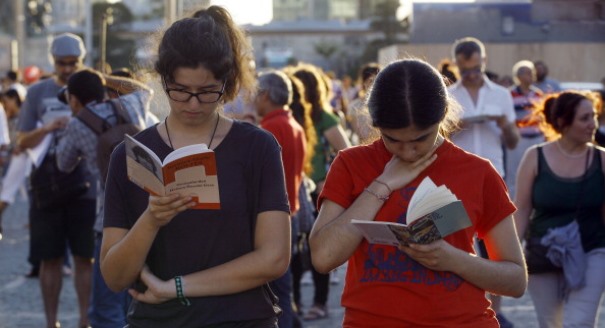Time for Strategic Europe’s annual summer reading suggestions! Carnegie Europe has asked a cross section of diplomats, policymakers, and analysts to share their favorite books.
Misha GlennyAuthor and broadcaster
Nonfiction
Money: The Unauthorized Biography by Felix Martin. Thanks to Martin, a broadly educated but deep thinker, we know now exactly who to blame for recurrent historical mistakes and who not to. Beautifully written for the specialist and nonspecialist alike, full of surprises and illumination.
Fiction
Trieste by Dasa Drndic. A marvellously taut retelling by a very gifted Croatian writer of the deportation of Trieste’s Jews.
Book from your home country (UK)
The German Genius: Europe’s Third Renaissance, the Second Scientific Revolution, and the Twentieth Century by Peter Watson. I can almost forgive the unwieldy subtitle because this is such a stunning explanation of the intellectual greatness of a country whose achievements were utterly eclipsed by its subsequent political failure. Unputdownable history.
Guilty pleasure
Daemon by Daniel Suarez—one of the greatest thrillers of the digital age. My second choice: How to Be a Woman by Caitlin Moran—just super, witty modern writing with real insight.
Ulrike GuérotSenior policy fellow and head of the Berlin office, European Council on Foreign Relations
Nonfiction
The Vertigo Years: Change and Culture in the West, 1900–1914 by Philipp Blom. This remarkable book catches history in a very unusal way. It is not about high politics, but about people’s feelings—and their fears, especially with regard to modernization, technological innovations, and societal changes. It’s a bottom-up book that basically tells you that the things we love and hate are astonishingly stable, whereas systems and regimes come and go!
Fiction
Housekeeping by Marilynne Robinson. Above all, this is the best English I have ever read: short, breathtaking sentences that capture millions of moments in just a few words. A very sad and beautiful story about a life that apparently has no goal other than to be.
Book from your home country (Germany)
Kürzere Tage (Shorter Days) by Anna Katharina Hahn. Set in bourgeois Stuttgart, this may be a very German novel about female lifestyle choices in modern Germany, but for anybody who has raised children in Germany while working, it is a very compelling story.
Guilty pleasure
Böse Schafe by Katja Lange-Müller. A touching story about a woman in 1980s West Berlin. A beautiful, loving encounter leads to a life that looks like a failure and a permanent struggle for survival, but probably isn’t.
Marc PieriniVisiting scholar, Carnegie Europe
Nonfiction
Dining with al-Qaeda: Three Decades Exploring the Many Worlds of the Middle East by Hugh Pope. A voyage through the convulsions of the Middle and Near East by an experienced journalist turned foreign policy analyst. You don’t dine with al-Qaeda on each and every page, though.
Fiction
Silk by Alessandro Baricco. This is a tiny book, yet one that takes the reader on an eerie voyage from France to Japan in the nineteenth century. Hard to imagine before reading it that so few pages can create such an imaginative journey.
Book from your home country
From my first home country (France): Rue des Voleurs (Street of Thieves) by Mathias Enard. This novel, which straddles Morocco and Spain, offers an impossible love story against the background of the Arab Spring.
From my “second home country” (Turkey): The Museum of Innocence by Orhan Pamuk. This is a big book, as Pamuk likes them, and a minute depiction of the Istanbul bourgeoisie of the 1970s together with a poignant (and multiple) love story. Captures the imagination and triggers some good laughs, too.
Guilty pleasure
Panique à Bamako (Panic in Bamako) by Gérard de Villiers. A spy novel, this author’s 195th (!), so well-informed that you could read the events of January 2013 back in September 2012. I’m not a big fan of the more graphic parts of the book, as de Villiers has a distinct tendency to copy-paste this feature of his novels.
Peter SpiegelBrussels bureau chief, Financial Times
Nonfiction
Ghost Wars: The Secret History of the CIA, Afghanistan, and Bin Laden, from the Soviet Invasion to September 10, 2001 by Steve Coll. The kind of book that I always wanted to write myself: a work of deeply reported journalism that reads like a novel, complete with spies, warlords, and superpower intrigue.
Fiction
The Bonfire of the Vanities by Tom Wolfe. Another journalist who brings his reporting eye to make fiction read like literature. Is there a better insight, in fact or fiction, into Manhattan’s sometimes combustible interplay of class, race, and religion?
Book from your home country (United States)
What It Takes: The Way to the White House by Richard Ben Cramer. The political book to end all political books—and everything modern campaign writing should be, but isn’t: nuanced, insightful, and compelling, with fully drawn and surprisingly sympathetic portraits of some of the United States’ most important but underappreciated leaders of the last century: Bob Dole, Joe Biden, George H.W. Bush.
Guilty pleasure
Early works by Tom Clancy, especially The Hunt for Red October, The Cardinal of the Kremlin, or Red Storm Rising. Spies, Soviets, nuclear brinkmanship. Ah, to be Cold Warriors again . . .
Alexandros YannisPolicy coordinator, European External Action Service
Nonfiction
The End of Power by Moisés Naím. Naím’s neo-Hobbesian approach to the current challenges of power is original and thought-provoking.
Fiction
Balthasar’s Odyssey by Amin Maalouf. A nostalgic Mediterranean adventure by one of the last polymaths of our time.
Book from your home country (Greece)
Aesop’s Fables. What else?
Guilty pleasure
Atlas of Remote Islands by Judith Schalansky. This book wonderfully merges geography, history, adventure, and imagination to make it the perfect holiday companion.






.jpg)